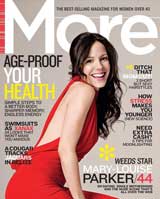Work Archive
Master Class
|

|
June 2009
More magazine asked six writers – Patricia Volk, Perri Klass, Patricia Marx, Joyce Carol Oates, Patricia J. Smith and me – "Do you really want to live to be 100?" You can find the others' answers in the June 2009 issue (p. 93).
Master Class
Were I to live to be 100, I would live again as long as I have so far, for I turned fifty this year. And though my instinct is to grab at the chance for all that future, all that unfolding and unspooling and revealing and recurring, all those seasons going round and round, my view from this hypothetical midpoint is tempered by what has come before.
To be frank, my fiftieth year was a harrowing one, containing the long illness and death of my mother and the collapse of my troubled marriage. A friend's sixteen-year-old daughter was killed. Another friend, six years younger than I, lay in bed, mysteriously failing, month after month. For the first two-thirds of the year I worked on a project of writing portraits of people I had known who had died. I started with a family friend I'd known when I was nine, worked through my father, my first husband, a stillborn child, and the teenage friends of my children. Right around the time I'd gotten up to the present, logging about fifty entries, both my mother and my friend were pronounced incurable. I decided to consider that manuscript complete.
Were I to live 50 more years, how many more volumes of that book could I fill? I would lose most of my friends and dear ones, I might bury a child or a grandchild. When I imagine facing all that pain, carrying all that loss, I feel very quiet inside. Not totally unwilling, but quiet.
I wonder if it is possible that life is actually about coming to terms with loss. Losing not just loved ones to death, but also facing and assimilating a multitude of other losses, tangible and intangible, great and small. Strands of hair in the drain of the shower, health and vigor, youth itself. A broken vase, a lost purse, a whole house taken by fire or flood. Friendships, jobs, pets, lovers, marriages. The tides of a lifetime sweep so much away, then return and take some more.
So much of our lives are spent reacting to our losses. In our grief, we act out in rage and revenge, in destruction and self-destruction , sometimes from the desire to remember and other times from the desire to forget. But with all that darkness there is light as well. So many of the beautiful things we do and make – quilts, gardens, shrines, poems, albums, scrapbooks – have loss at their root. So many acts of kindness and empathy, so many new bonds between people. Even political and social movements are often founded in the grief of one person or many.
Whatever else a life of 100 years would bring, it would be the master class in loss, the post-doctoral course in letting go. It scares me to the core. But being afraid is the signal for being brave, and trying to make the brave choice is part of what's gotten me this far. So, yes, I think I would sign up.
 |
